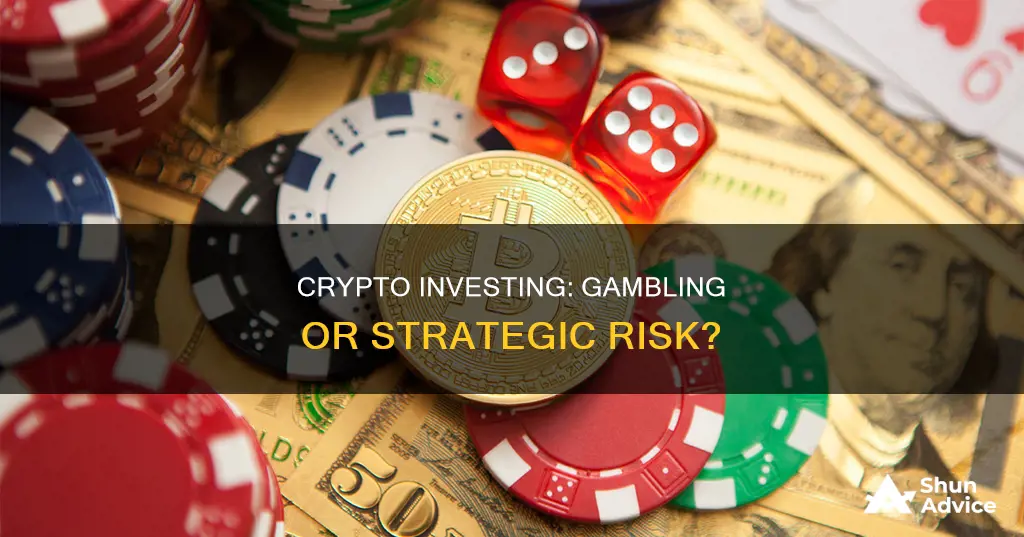
There is an ongoing debate about whether investing in cryptocurrencies is more akin to gambling than traditional investing. Cryptocurrency gambling is often compared to casino gambling, as both involve risking something of value for a chance to gain something else of value. However, there are key differences between the two activities. Gambling is typically associated with betting on uncertain outcomes, such as horse races or card games, and is often considered entertainment. In contrast, cryptocurrencies are decentralised digital assets based on mathematics and cryptography, offering features like security and historical data. While some argue that the volatile nature of cryptocurrency prices and the element of risk involved in crypto trading resemble gambling, others view it as a legitimate investment opportunity. The line between crypto investing and gambling remains blurred, with some experts and regulatory bodies advocating for the treatment of crypto as a form of gambling due to its high-risk nature and lack of underlying value.
| Characteristics | Values |
|---|---|
| Definition of gambling | "To bet on an uncertain outcome" |
| Cryptocurrency | A digital asset that uses cryptography to secure its transactions and to control the creation of new units |
| Difference between gambling and cryptocurrency | Cryptocurrency is decentralized, based on mathematics and cryptography, and has history and projects to back it up |
| Cryptocurrency gambling | Gambling with digital assets instead of physical currency |
| Crypto investing | Very risky, surrounded by criminals, not a proper investment, no income, highly volatile |
| Crypto as a gamble | Crypto investors are gambling that there will be someone to buy it off them at a future date for a higher price |
| Crypto as an investment | Crypto investors consider themselves experts, know the risks, and can afford to lose |
What You'll Learn

Crypto's high risk and volatility
Cryptocurrency is a highly volatile and risky investment. All cryptocurrencies experience huge fluctuations in their valuation, and this volatility is in a league of its own. In one day, Bitcoin's value dropped by 30%. This volatility is due to the speculative nature of the investment, which is based entirely on educated guesswork. Without anything intrinsically valuable to back up the currency, crypto's market value is based on how much people are willing to trade for it.
The high risk and volatility of cryptocurrencies are reflected in their returns, which can be extremely high but are accompanied by very high volatility. This is a challenging and bumpy investment ride, and not for the faint-hearted.
The GARCH model, which is the standard technique for demonstrating unpredictability in financial time series data, has been used to analyse the volatility of cryptocurrencies. The study found a strong spillover effect among different cryptocurrencies, with Bitcoin and Ether exhibiting an asymmetric impact on their volatility compared to Litecoin and XRP.
The high volatility of cryptocurrencies can be further attributed to the influence of certain individuals, like Elon Musk, whose tweets have been shown to significantly affect Bitcoin's value.
In summary, the high risk and volatility of cryptocurrencies make them a very different kind of investment, and potential investors need to be aware of the potential for significant losses as well as gains.
Worldcoin: The Next Big Crypto Investment Opportunity?
You may want to see also

Criminal activity in crypto
The blockchain has created an ecosystem in which illicit actors can operate anonymously and internationally, hindering financial investigations and leading to an increase in crypto-related crime. Cryptocurrency is becoming an increasingly popular tool for organised crime groups (OCGs) to conduct illicit activities, such as money laundering, financial sanctions evasion, bribery, and embezzlement. The anonymous and decentralised nature of cryptocurrencies allows criminals to move large sums of money with a lower risk of detection by law enforcement or traditional financial institutions.
Ransomware Attacks
Ransomware attacks have seen a massive increase, with payouts hitting $449.1 million in the first half of 2023, up from $175.8 million in the same period in 2022. Attackers use malicious attachments, embedded links, or exploit vulnerabilities to infiltrate a system and demand ransom payments in cryptocurrency to release sensitive data or restore system access. The U.S. Justice Department successfully disrupted the Hive ransomware group, which targeted over 1,500 victims in 80 countries and received over $100 million in crypto ransomware payments.
Scams
Cryptocurrencies are ideal for scams as they are instant, anonymous, borderless, and require no formality between parties. In 2019, the PlusToken Ponzi scheme defrauded millions of victims, stealing $2.35 billion. Another example is the TerraUSD and Luna tokens, which collapsed in May 2022, wiping out over $40 billion in value. Many claim this was also a Ponzi scheme, and the creator was charged with securities fraud.
Darknet Markets & Illicit Trade
Darknet marketplaces are websites hosted on the dark web, accessible only through specific browsers, allowing for secured and anonymous browsing. These marketplaces facilitate drug trade, stolen data sales, arms dealing, human trafficking, and the sale of child sexual abuse materials (CSAM). In 2022, dark marketplaces and fraud shops accounted for over $1.5 billion worth of cryptocurrency transactions, down from $3.1 billion in 2021 due to the collapse of Hydra Market, the highest-earning darknet market that year.
Theft
While cryptocurrency is often touted as secure, it is vulnerable to theft through hacking, social engineering, and phishing scams. In 2022, hackers stole a total of $4 billion worth of crypto. The largest known cryptocurrency theft was the $600 million Poly Network hack in August 2021, a decentralised finance ("DeFi") cryptocurrency platform. Following the return of the stolen funds, Poly Network invited the hacker responsible to become their Chief Security Advisor.
Money Laundering
Criminals are laundering increasing amounts of cryptocurrency by moving it to reputable exchanges. In 2019, criminal entities moved $2.8 billion in Bitcoin to exchanges, with more than half going to the two most popular ones, Binance and Huobi. Third-party "over the counter" (OTC) brokers facilitate trades between buyers and sellers who wish to avoid regulated exchanges. While most OTC brokers run legitimate businesses, some specialise in providing money laundering services for criminals.
Terrorist Financing
International and domestic terrorists exploit cryptocurrency to fund their organisations. Terror organisations solicit requests for funds on their websites, social media, encrypted messaging applications, and the dark web. In June 2023, Israel seized crypto accounts linked to two terror groups, confiscating $1.7 million in terror funds. In August 2020, the U.S. Department of Justice dismantled three significant cryptocurrency-based terror financing campaigns, seizing $2 million in cryptocurrency, over 300 cryptocurrency accounts, four websites, and four Facebook pages.
Hero Coin: A Good Investment Option?
You may want to see also

Lack of regulation and legal boundaries
The unregulated nature of cryptocurrencies and the lack of legal boundaries have been a significant concern for investors and policymakers. The decentralized structure of cryptocurrencies, not being controlled by any single entity, presents a unique challenge for regulation. This lack of regulatory clarity has led to a situation where crypto investors often find themselves in a legal grey area, with varying levels of protection across different jurisdictions.
The absence of consistent regulation across countries has resulted in a fragmented global response, creating an uneven playing field. Crypto companies and investors can easily move their operations to jurisdictions with more favorable or lenient regulatory environments, often referred to as regulatory arbitrage. This migration of crypto businesses can lead to a "race to the bottom," where countries compete to attract crypto investments by offering relaxed regulatory frameworks, potentially compromising consumer protection and financial integrity.
The terminology and classification of crypto assets also vary globally, further complicating the regulatory landscape. For example, in the US, the Commodity Futures Trading Commission (CFTC) treats Bitcoin as a commodity, while the Internal Revenue Service (IRS) considers it property. This discrepancy in classification within the same country highlights the challenges in establishing consistent regulatory standards.
The rapid evolution of the crypto market also poses challenges for regulators. The dynamic nature of the industry, with constant innovations and new products, makes it difficult for regulators to keep pace and acquire the necessary talent and skills to effectively oversee the market. Additionally, the cross-border nature of crypto transactions and the involvement of multiple stakeholders with varying regulatory frameworks further complicate the task of implementing comprehensive regulations.
The lack of regulation in the crypto space has led to increased risks for investors, including money laundering, fraud, and financial losses. The failure of crypto exchanges, issuers, and hedge funds has also highlighted the need for stronger consumer protection measures. As a result, there have been growing calls for coordinated global regulatory efforts to address these concerns and provide a safe environment for investors.
In summary, the lack of regulation and legal boundaries in the crypto space has resulted in a complex and inconsistent regulatory environment. The decentralized nature of cryptocurrencies, their rapid evolution, and the cross-border nature of transactions have posed significant challenges for policymakers. As the crypto industry continues to grow and integrate with traditional financial systems, the need for comprehensive and coordinated global regulations becomes increasingly crucial to protect investors and maintain market integrity.
Bitcoin: Investment or Speculation?
You may want to see also

The role of chance and skill in crypto
The role of chance and skill in the crypto market has been a subject of debate, with some arguing that it is more akin to gambling, while others view it as a legitimate investment opportunity. So, what are the key factors that distinguish crypto from gambling, and to what extent do chance and skill play a role?
Firstly, it is essential to understand the fundamental differences between gambling and investing in cryptocurrencies. Gambling is typically associated with betting on uncertain outcomes, such as horse races or card games, where the odds are stacked in favour of the house. In contrast, cryptocurrencies are decentralised and based on mathematics and cryptography, offering a level of transparency that traditional gambling venues do not. Additionally, while gambling is primarily entertainment-focused, cryptocurrencies serve as a store of value, similar to gold or silver, with their prices influenced by market demand.
However, it is worth acknowledging that elements of chance and skill are present in both gambling and crypto investing. In the context of crypto, chance can be observed in the highly volatile nature of the market, where prices can fluctuate drastically within short periods. This volatility is driven by various factors, including market sentiment, news, and the actions of influential individuals or entities. As a result, crypto investors may find themselves at the mercy of unpredictable market forces, requiring a degree of adaptability and quick decision-making.
On the other hand, skill also plays a significant role in crypto investing. Successful investors often possess a deep understanding of the market, including technical analysis skills, the ability to interpret market trends, and a long-term perspective. They may employ strategies such as dollar-cost averaging or buying during market dips to optimise their investments. Additionally, risk management skills are crucial, as investors must carefully assess their risk tolerance and allocate their investments accordingly. Diversification across multiple cryptocurrencies or blockchain-based projects can also help mitigate risks.
While chance may dominate the short-term price movements in the crypto market, skill becomes a more prominent factor over the long term. Investors who conduct thorough research, stay informed about market developments, and make strategic decisions based on their analysis are more likely to achieve favourable outcomes. This is in contrast to gambling, where the role of skill is often limited to game-specific strategies, and the odds are inherently stacked against the player.
In conclusion, the role of chance and skill in crypto investing is multifaceted. While the market's volatility introduces an element of chance, the ability to navigate this uncertainty through knowledge, strategy, and risk management leans towards the importance of skill. Ultimately, a combination of both factors influences the outcomes in the crypto market, and investors who recognise and effectively manage these elements are better positioned to succeed.
Bitcoin: Smart Investment or Risky Gamble?
You may want to see also

The psychological characteristics of crypto investors
There are several psychological characteristics that are common among crypto investors. These characteristics can be used to categorise investors into different groups. One study identified three distinct groups of crypto investors: cypherpunks, hodlers, and rookies. Cypherpunks are early adopters of crypto, often driven by technological interest or ideological conviction. Hodlers tend to be middle-aged and are motivated by the potential for large gains. Rookies are newer investors, often driven by a fear of missing out (FOMO) on the gains that crypto can offer.
Other studies have identified different psychological characteristics that are common among crypto investors. These include higher novelty-seeking, higher gambling tendencies, and unique investment patterns. Crypto investors also tend to have higher scores on the Fear of Missing Out (FoMO) scale, indicating that they are more sensitive to rewarding experiences and are concerned about missing out on potential gains.
In addition, crypto investors often exhibit higher risk-taking behaviour and a greater willingness to take on risk in pursuit of higher returns. This can lead to more impulsive decision-making and a focus on short-term gains rather than long-term investment strategies.
Overall, the psychological characteristics of crypto investors can vary depending on their level of experience, gender, age, and other factors. However, there are some common traits that are often associated with this group of investors, such as higher novelty-seeking, higher risk tolerance, and a greater focus on short-term gains.
A Beginner's Guide to Investing Bitcoin in Canada
You may want to see also







